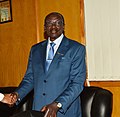History
Zimbabwean president Emmerson Mnangagwa was sworn in for his second full term on 4 September 2023 following his disputed re-election in the 2023 Zimbabwean presidential election. [1] On 8 September 2023, Mnangagwa reappointed Constantino Chiwenga as First Vice-President and announced the return of Kembo Mohadi as Second Vice-President. Mohadi had resigned from the role back in March 2021 due to a sex scandal. [2]
Mnangagwa announced the formation of his third cabinet on 11 September 2023. [3] The new cabinet consists of 26 ministries. The State Security ministry was initially scrapped, though was reinstated in November 2024. The Defence and War Veterans ministry was split into two new ministries and a new Ministry of Skills Audit and Development was created. [4] [5]
Controversially, Mnangagwa appointed his son, Kudakwashe, and his nephew, Tongai, to the positions of Deputy Minister of Finance and Investment Promotion and Deputy Minister of Tourism and Hospitality, respectively. [6] Former State Security minister Owen Ncube, who was dismissed by Mnangagwa in January 2022, returned to cabinet as minister of Midlands Provincial Affairs. [7]
All the newly appointed ministers and their deputies were sworn in the following day, [8] with the exception of John Paradza and Nokuthula Matsikenyeri. The Constitution of Zimbabwe only permits the President to appoint seven non-Parliamentary members to Cabinet, however Mnangagwa had appointed nine. Matsikenyeri's appointment was rescinded on 12 September, and she was replaced by Misheck Mugadza, MP for Mutasa South. Paradza's appointment was not rescinded, but his swearing in was postponed until his victory in the Gutu West by election on 11 November 2023. [9]
This page is based on this
Wikipedia article Text is available under the
CC BY-SA 4.0 license; additional terms may apply.
Images, videos and audio are available under their respective licenses.












